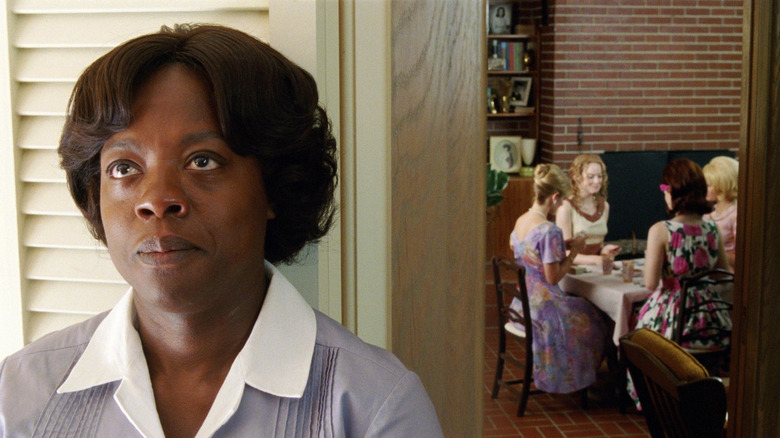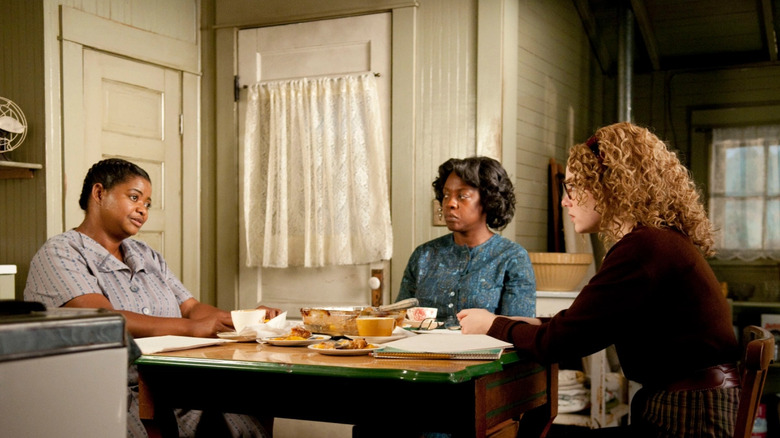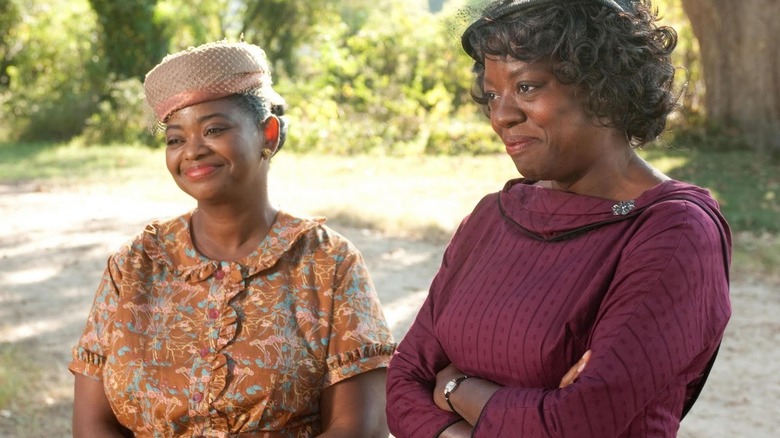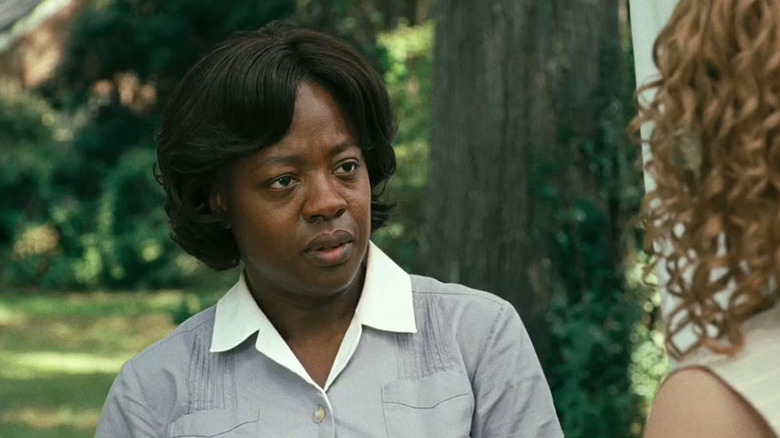Is The Help Based On A True Story? Here's The Truth
In 2011, director Tate Taylor released his historical drama "The Help," a story that focuses on Black maids working and living with white families in the American South in the 1960s and attempts to put the focus on the maids rather than their (often bigoted and controlling) employers. Based on a novel of the same name by Kathryn Stockett, the film stars Viola Davis as Aibileen Clark, Octavia Spencer as Minny Jackson, and Emma Stone as Eugenia "Skeeter" Phelan, an aspiring writer who takes it upon herself to compile the stories of Black maids, including Minny and Aibileen, to tell the truth about how "the help" are treated — particularly in Jackson, Mississippi. Aibileen works for Skeeter's friend Elizabeth Leeholt (Ahna O'Reilly), a neglectful mother to her young daughter (upon whom Aibileen dotes), while Minny works for the odious and cruel Hilly Holbrook (Bryce Dallas Howard) and her mother (played by Sissy Spacek). After an incident involving a bathroom and an unforgettable "apology pie," Minny ends up working for Celia Foote (Jessica Chastain), a lonely and wealthy new addition to Jackson who finds a confidante in Minny.
To be perfectly blunt, while Taylor and Stockett's mission here is admirable, the movie does still largely center Stone as the story's heroine, particularly when her book, also titled "The Help," makes waves in Jackson by revealing some of the cruelty shown to the maids by their employers (though they're not named, it's easy enough to figure out who's who based on context clues, sending women like Elizabeth and Hilly into a frenzy). So is "The Help" based on real stories of domestic Black workers during the civil rights movement? Yes and no.
The Help is based on a work of fiction by Kathryn Stockett
Kathryn Stockett's novel "The Help" was released in 2009, and during the acknowledgements, Stockett included an ode to a woman named Demetrie McLorn, who, per Stockett's own works, "carried us all out of the hospital wrapped in our baby blankets and spent her life feeding us, picking up after us, loving us, and, thank God, forgiving us." Notably, the acknowledgements are followed immediately by a personal essay titled "Too Little, Too Late" that explains McLorn was Stockett's family maid, and that Stockett was inspired by her experiences with McLorn. "I'm pretty sure I can say that no one in my family ever asked Demetrie what it felt like to be [Black] in Mississippi, working for our white family," Stockett writes. "It never occurred to us to ask. It was everyday life. It wasn't something people felt compelled to examine. I have wished, for many years, that I'd been old enough and thoughtful enough to ask Demetrie that question. She died when I was sixteen. I've spent years imagining what her answer would be. And that is why I wrote this book."
So the truth is that "The Help" is sort of based on a true story in that Stockett, who was born at the end of the 1960s, did grow up with a Black domestic worker in her family home. Stockett has certainly, throughout the years, faced criticism over the fact that she spends the book telling Black stories from a white perspective, including using phonetically written dialect — and in a 2011 interview with The Guardian, Stockett was asked by Elizabeth Day if she hesitated regarding the dialect. Apparently, McLorn also inspired that aspect of the book.
"It wasn't hard for me to get that musicality on the page because I started writing the voice of Demetrie and she sounded exactly the way I wrote her. Later, that voice became the character of Aibileen," Stockett said, though she had some misgivings. "At the same time, I was mortified that I was doing the very thing I'd been taught not to do, which was to touch on the issue of race, to highlight the things that separate us. I'm still thinking I'm going to get into trouble. I'm still not comfortable with what I've done. It's a strange thing."
After the film adaptation was released, The Help was nominated for multiple Academy Awards
Despite perfectly understandable misgivings that people may have about "The Help," there's no denying that the film was an enormous success when it hit theaters in the summer of 2011. Not only did it make a stunning $221 million at the box office off a budget of just $25 million, but it ended up nominated for multiple Academy Awards, including Best Picture, Best Actress for Viola Davis (who lost to Meryl Streep for "The Iron Lady"), and two nominations in the Supporting Actress category for Jessica Chastain and Octavia Spencer. Ultimately, Spencer took home her first Oscar for playing Minny Jackson (and, despite the movie's missteps, her performance is genuinely spectacular), but it's interesting to note that both Davis, Chastain, and Emma Stone went on to win Oscars in the coming years for their performances in "Fences," "The Eyes of Tammy Faye," and "La La Land," respectively.
"The Help" also earned solid reviews from critics, sitting pretty with 76% on Rotten Tomatoes with a critical consensus that reads, "Though arguably guilty of glossing over its racial themes, The Help rises on the strength of its cast – particularly Viola Davis, whose performance is powerful enough to carry the film on its own." Even detractors of "The Help" must admit that Davis, Spencer, Chastain, Stone, and Bryce Dallas Howard, who make up the main cast, all deliver powerhouse performances that complement each other beautifully ... although, in the film's aftermath, Davis admitted that she actually regrets playing Aibileen at all.
Viola Davis says she regrets starring in The Help
In September of 2018, Viola Davis sat down with Mekado Murphy from The New York Times so that Murphy could ask Davis reader-submitted questions — and when one such reader asked Davis if she'd ever said no to roles and later regretted it, Davis brought up "The Help" without any prompting whatsoever. "Almost a better question is, have I ever done roles that I've regretted? I have, and 'The Help' is on that list," Davis answered bluntly and honestly. Still, Davis clarified that she loved working with her co-stars — calling her fellow actresses "extraordinary human beings" with whom she built strong friendships — and praised Tate Taylor as well. So why did she regret playing Aibileen Clark?
"I just felt that at the end of the day that it wasn't the voices of the maids that were heard," Davis concluded. "I know Aibileen. I know Minny. They're my grandma. They're my mom. And I know that if you do a movie where the whole premise is, I want to know what it feels like to work for white people and to bring up children in 1963, I want to hear how you really feel about it. I never heard that in the course of the movie."
A few years later, Davis still felt the same way. Speaking to Vanity Fair in July 2020, Davis was even more forthcoming, saying that the film was "created in the filter and the cesspool of systemic racism" after admitting, "There's no one who's not entertained by 'The Help.' But there's a part of me that feels like I betrayed myself, and my people, because I was in a movie that wasn't ready to [tell the whole truth]."
"The Help" is available to rent or stream on major platforms now.



